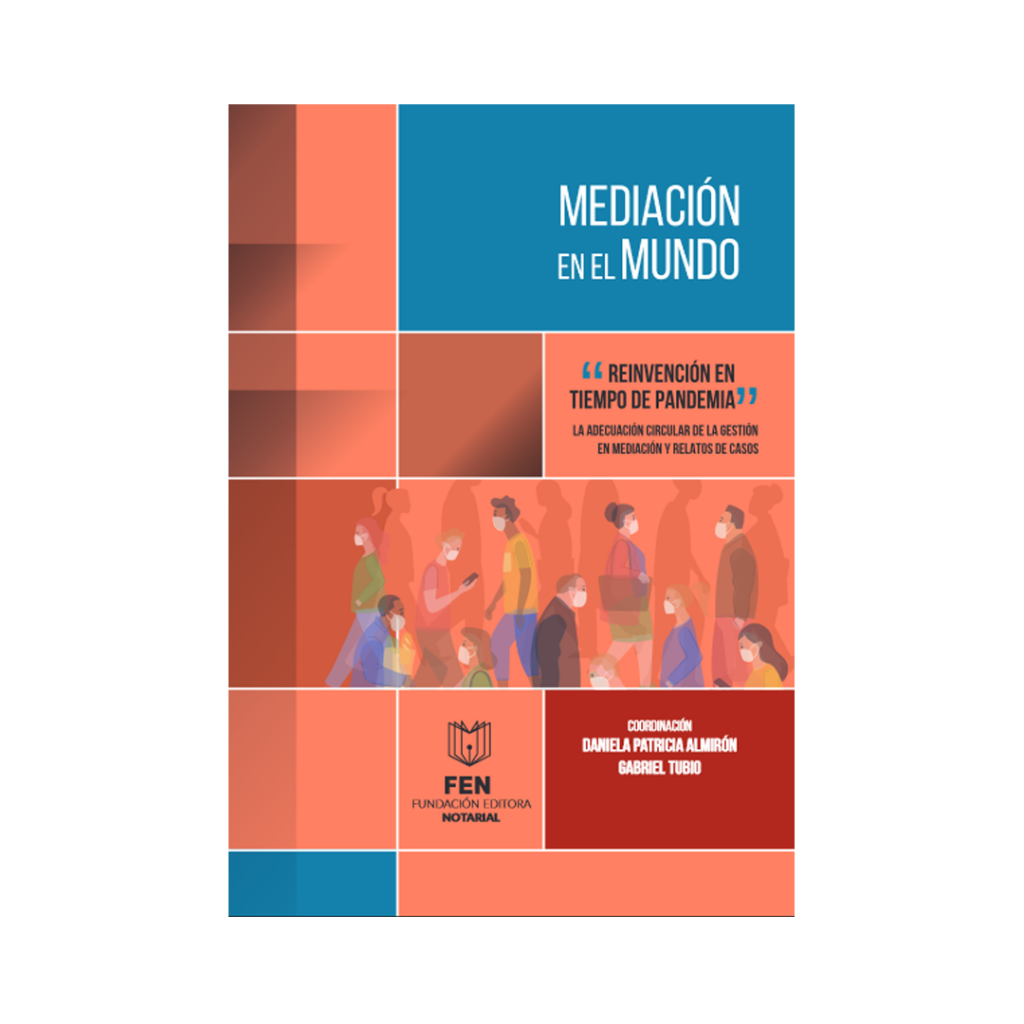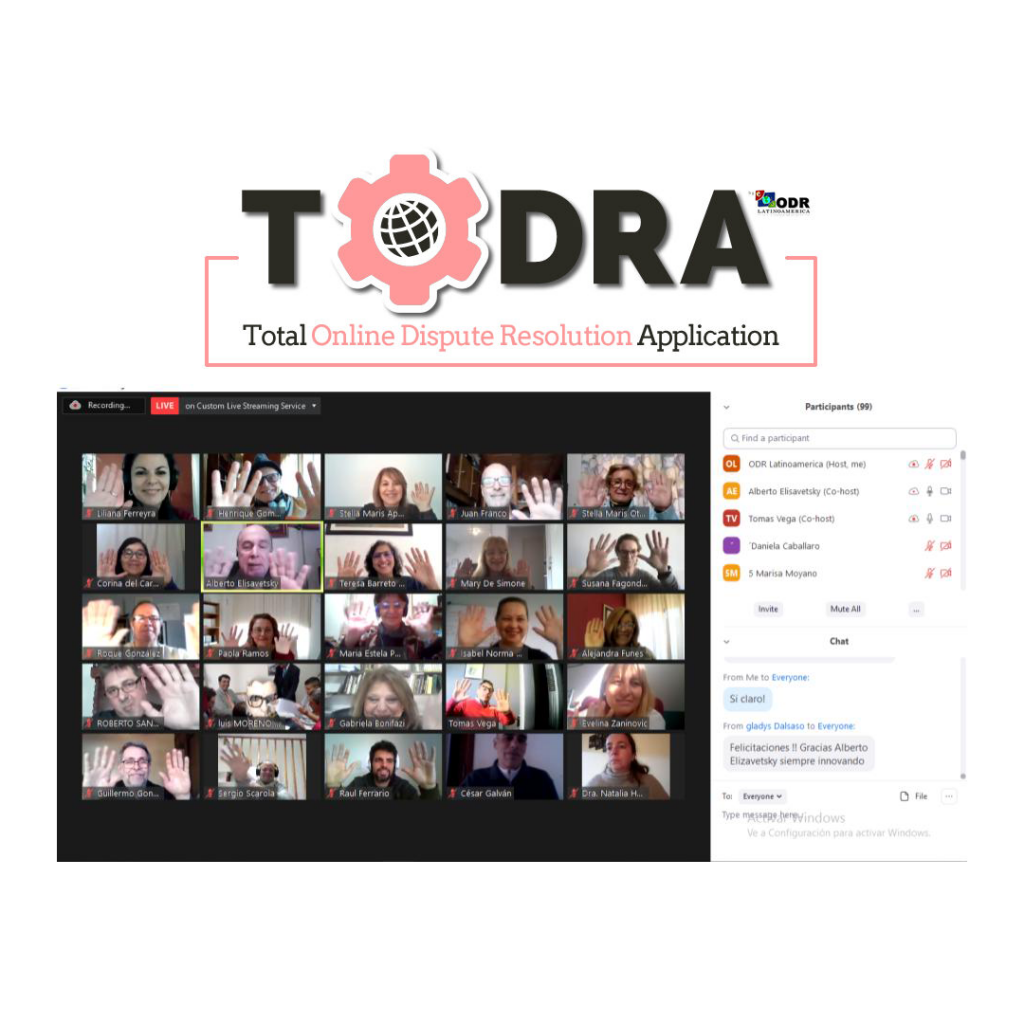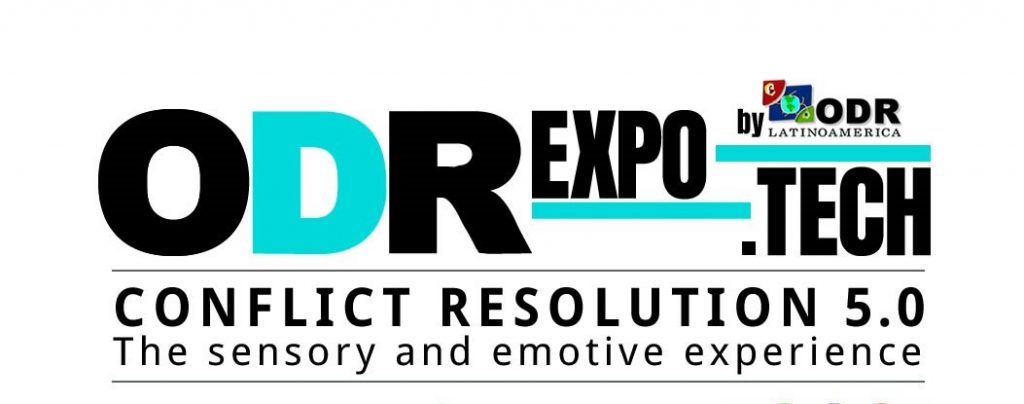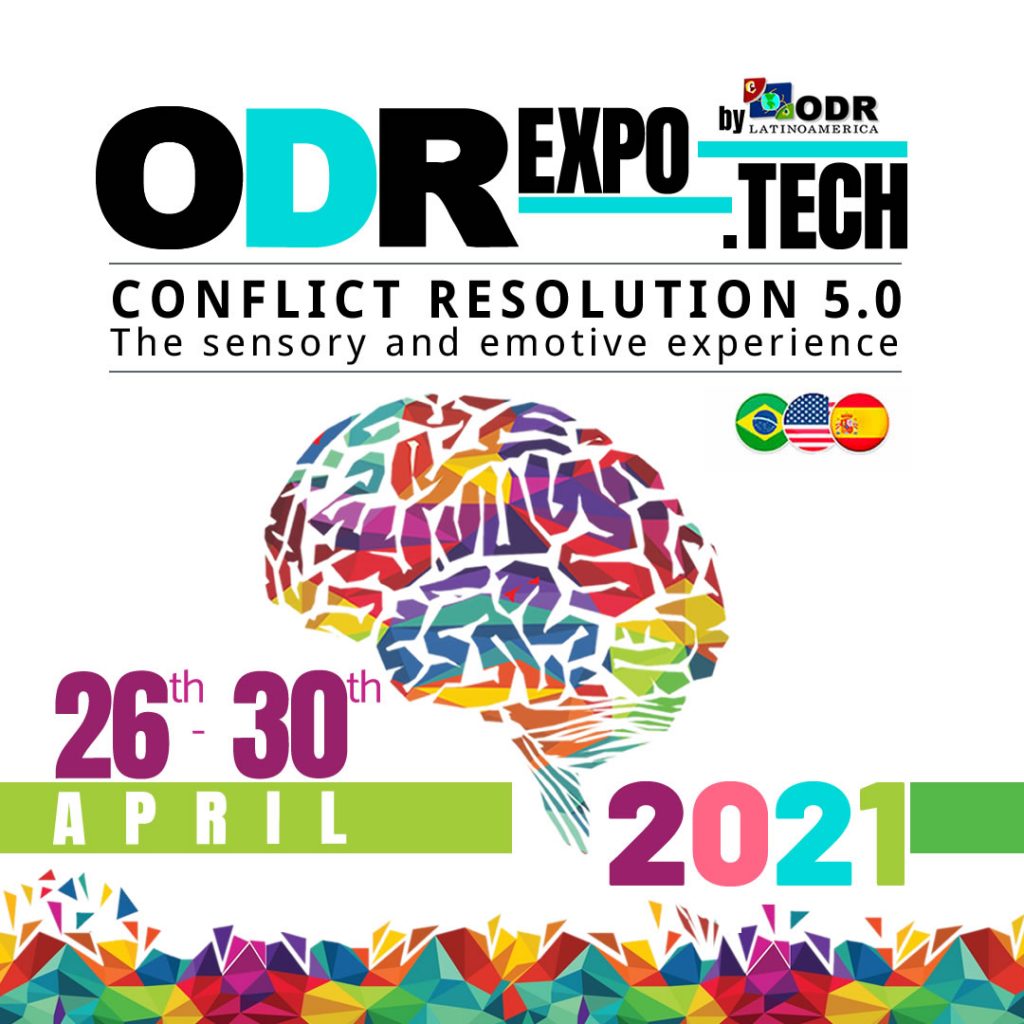August 2021 – Posted on https://www.mediate.com/articles/marun-ODR.cfm
INTRODUCTION
Much has been written about the future. However, when we
read about “what will come” we see it as “something far away”. It is a
perception that is always accompanied by the certainty of the present
and the randomness of “tomorrow” (most likely we think “We don’t know
what is going to happen and… if it will happen).
It has cost us, human beings, and it is difficult for us to
understand what are the steps we must take in order to reach the
future. This is so, because making this reflection forces us to think
about the simple, ordinary and everyday things that normally fill our
days with occupations, and imagine them in a change, for example, the
products we buy, the places we frequent, the social organizations in
which we live, the people who integrate our lives, our jobs and / or
professions, the lifestyle we live in the present, etc. Probing these
these aspects, thinking about their future reality, is not an easy task
because it takes us out of the comfort zone that the present gives us,
because in our present is “what we know about life”.
Alvin Toffler, in his work “Shock of the Future” said that
the individual to survive, to avoid what the author calls “shock of the
future”, must become infinitely more adaptable and sagacious than at any
time before. However, before human beings can do this, they must
understand in more detail how the effects of acceleration influence
their personal life, creep into their behavior, and alter their quality
of existence. In other words: We must understand transience. That idea
of ??transience of which the author speaks confronts us with a truth
”What today is… tomorrow may not be”. And this is what has happened to
us worldwide with the serious COVID19 pandemic, which has come to
modify all that present that we had not long ago, in our way of life,
our customs, the rules of coexistence developed by different countries,
etc. .All that social construction that we had for many years, until a
year ago, we realize that they no longer serve us, and most
importantly, we are not sure if they will serve us again. Because there
is no doubt that when the COVID19 Pandemic passes, it will be very
possible that the reality of the world has changed and we need to
continue building new ways of coping with existence, as world history
has shown us each time a similar situation raised
And, within this great change that we are travelling at
high speed, is the way in which we have been applying procedures for the
resolution of conflicts, in that relatively slow evolution, -compared
to today-, in which we have been sustaining for several years, from the
RAD (Alternative Dispute Resolution) methods, to the RDL (Online
Dispute Resolution), a topic that we propose to address in this work.-
ALVIN TOFFLER, THE FUTURE AND ODR
Alvin Toffler predicted that “The illiterate of the 21st
century will not be those who cannot read or write, but rather those who
cannot learn, forget learning, and learn again.”
Toffler also predicted the spread of interactive media, internet chat rooms, and devices that remind you of “your own dates.”
“Advanced technology and information systems will make it
possible for much of society’s work to be done at home via
telecommunications over computer connections.”
The author said that the development of information and
communication technologies would allow previously unthinkable benefits.
An example of these benefits is telework, predicted for the third wave.
However, the educational aspects of this wave seem to have preserved
the characteristics of the second wave, this is, education continued in
the third wave, under the needs of the second wave.
But in terms of RDL (Online Dispute Resolution – ODR -,
there was a group of pioneers in the world, (Professor Ethan Katch and
his team), who saw the need to value the existence of ICT, and apply
them to Conflict Resolution Systems, and they gave rise to RDL. Since
1996 the “National Center for New Technologies Applied to Dispute
Resolution” at the University of Massachusetts Amherst, focused its
research on exploring different ways that allow articulate Conflict
Resolution and the use of New Information and Communication Technologies
to manage cross-border problems derived from electronic commerce, as a
founding activity. The group of experts in charge of this reaserch
perceived that the Internet would generate the opening of an appropriate
communicational space to solve conflicts.
In Argentina, we have also had a pioneer in ODR issues.
Since 2006, Dr. Alberto Elisavetsky has investigated the
characteristics, possibilities and limitations of the so-called “online
conflict resolution methods” (RDL). The origin of the analysis abaut
the posibility of application in contemporary society of these
mechanisms came from the studies carried out by the group of academics
led by Professor Ethan Katsh, creator of the National Center for New
Technologies Applied to the Resolution of Disputes of the University of
Massachusetts Amherst.
Also, Dr. Alberto Elisavetsky created ODR Latin America, – a
Social, Scientific and Academic Network-, that has brought together
all of us who believe in the ODR system, organizing countless events
around the world, exploring possibilities and encouraging the use of ODR
as an alternative method of Resolution. Conflict, warning different
responses. Some people convinced about the real possibilities of this
online method to resolve conflicts and others situated in their comfort
zone, wondering “What for?”.
The COVID 19 Pandemic had to arrive in an untimely,
precipitous, defiant and threatening way, so that we all are able now
to understand, what Alvin Toffler wanted to warn about in the mid-1970s,
and what proclaimed and still continue Professors of the National
Center for New Technologies Applied to Dispute Resolution of the
University of Massachusetts, next to their teams and disciples.
ODR AND THE “RED QUEEN EFFECT“
The statement known as “The Red Queen effect” derives from
the passage of the book “Alice Through the Looking Glass” , a
continuation of the children’s novel “Alice in Wonderland”, in which
Alice, running without stopping, dragged by the Red Queen’s hand, who
was screaming “faster! faster!” thought “I wonder if things are moving
with us? and the Queen, guessing her thoughts, shouted her: Faster,
don’t try to speak! “…
When they stopped for a moment “Alicia, surprised, looked
around her: – I think we’ve been under this tree all the time!.
Everything is the same as it was -Of course! -said the Queen- ¿How was
it going to be? Well, in my country, -said Alice, still panting,-, if
you run so fast for so long, you usually get somewhere else … “A
rather slow country!” replied the Queen. “Here, you have to run
everything possible to stay in the same place. To get to another place
you have to run twice as fast “
Leigh Van Valen, in an article entitled “A new evolutionary
law”, raised in 1979 the Red Queen hypothesis as an ecological and
evolutionary principle, which would later become known as the Red Queen
Hypothesis, which describes that continuous improvement . of the
species is necessary, only with the objective of maintaining their
status quo with the environment. Transferring this concept to our much
appreciated task in Online Conflict Resolution, we must say that from
many years ago, we “came running” like Alice, trying to get ODR to keep
up with the times, to reach this moment when the pandemic situation,
desperately has claimed for the use of ODR, as an alternative means to
allow access to justice for so many people who cannot leave their homes
due to the regulations that have been imposed in order to avoid
contagion. .
ODR, THE FUTURE, PANDEMIC, AND THE RED QUEEN EFFECT
Dr. Alberto Elisavetsky in a conference at the annual
Meeting of Mediators in the City of La Plata. Buenos Aires, Argentina,,
on November 13, 2018, stated “face-to-face mediation is over”.
Probably, many people didn’t understand the meaning of his words.
Since that date, a short time has passed, and we are able
today to see that the future has already arrived. We find ourselves
swimming the waters of the “future of Alvin Toffler” and running the
“race of the Red Queen and Alice”. An example of this is that ODR Latin
America with its Director Alberto Elisavetsky, and the team of academic
professionals who support him, have developed and go on developing
training courses, for mediators in the field of On line Dispute
Resolution, because of the request of Government agencies and / or
Private Organizations, giving them the capabilities of the e-mediator in
Argentine Provinces of Córdoba, Mendoza, Salta, Neuquén, Buenos Aires,
and in countries as Chile, Brazil, Mexico, Ecuador, Spain, Costa Rica,
etc ..-
We must say that the pandemic situation that we are facing
globally has brought us closer to that future that many saw so distant.
This is the future. It just has come. It’s here. We must be prepared,
understanding that the world in which we have lived these first decades
of the 21st century has changed and will continue changing rapidly …
all the governments of the planet, even those of the most developed
countries, are finding this coping, this accommodation. to the
circumstances, in order to continue providing the fulfillment of the
human rights of their inhabitants. And, all of us, who have valued and
worked for a long time in the field of On line Conflict Resolution, we
have been able to verify that we were right when we pondered this
system, because it has become an excellent alternative, so that, despite
the factual situation of the pandemic, all the people can continue to
exercise their right of access to justice.
ENDNOTES
ELISAVETSKY Alberto “La Mediación a la luz de las nuevas Tecnologías” Ed. Erreius- BsAs
Lewis Carroll Through the Looking-Glass, and What Alice Found There)? 1871.
Toffler A. Traducción de J. Ferrer Aleu. (1973). El “shock” del futuro. Barcelona España. Plaza & Janes, S.A, Editores.
Toffler, A. (1985). La tercera ola. Barcelona: Orbis.
VAN Valen Leigh A NEW EVOLI.NIONANY LAW – Department of Biology The University of Chicago Chicago, Illinois 60537- 1979
https://www.mn.uio.no/cees/english/services/van-valen/evolutionary-theory/volume-1/vol-1-no-1-pages-1-30-l-van-valen-a-new-evolutionary-law.pdf
Biography: María Victoria Marun
Attorney Mediator and Senior Lecturer in Law. University Teaching
Specialist. Director at Center for Alternative Dispute Resolution of the
Bar and Solicitors of the 3rd Legal Circumscription Mendoza. Argentina.
University Teaching. Trainer in School Law and Conflict Resolution in
Educational Institutions. Investigator ad hoc at Social Conflict
Observatory of the National University of Tres de Febrero, Buenos Aires,
Argentina. Founder member of ODR Latin Ameríca Academy. Director at
Center for Alternative Dispute Resolution of the Bar and Solicitors of
the 3rd Legal Circumscription Mendoza. Argentina. University Teaching.
Trainer in School Law and Conflict Resolution in Educational
Institutions. Investigator ad hoc at Social Conflict Observatory of the
National University of Tres de Febrero, Buenos Aires, Argentina. Founder
member of ODR Latin Ameríca Academy





